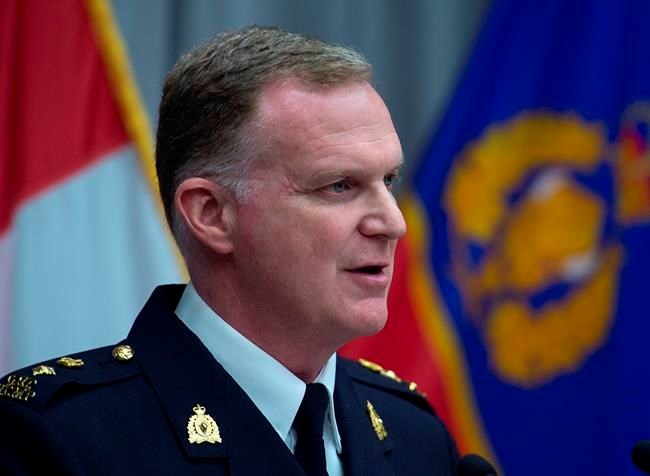OTTAWA — The fervent and sometimes frustrating quest for details of a Nova Scotia gunman's deadly rampage has rekindled concerns about the RCMP's traditional reticence concerning major criminal probes.
More than a decade after the national police force embarked on a modernization drive, media advocates and journalism professors say the RCMP has not yet evolved into the forthcoming and transparent institution Canadians need and deserve.
The police initially said the Nova Scotia suspect had been taken into custody, and only later did a senior unnamed source confirm he had been dead for several hours, and that citizens and an RCMP officer had been killed.
Information on the calibre and types of guns the RCMP seized was kept under wraps for days, and questions about their origins remain unanswered.
The Mounties' approach to media relations stems from an outlook that has been ingrained over many decades, said journalist and author Stephen Kimber, who teaches at the University of King's College at Dalhousie University in Halifax.
"There's a military mindset that the RCMP operate under, which is very much top-down and need-to-know," he said. "And if they decide you don't need to know, you don't need to know."
Following a particularly difficult period marked by controversy and scandal, a government-commissioned report by Toronto lawyer David Brown concluded in 2007 the RCMP suffered from a "horribly broken" culture and management structure.
A council on reform implementation urged force managers to see communication as a positive opportunity to reach out to those they serve, rather than as a challenge or threat.
"The RCMP must improve its ability to anticipate communication opportunities and requirements and to react quickly and effectively where unforeseen events occur," the council said. "We understand the difficulties of doing this, but fast action or reaction is one of the fundamental requirements of successful communications, and we think more can still be done."
Media advocates and educators see little tangible progress.
The Canadian Association of Journalists awarded the RCMP its 2017 Code of Silence Award for Outstanding Achievement in Government Secrecy in the category of law enforcement agencies.
More recently, the association pressed the RCMP over continued access to an exclusion zone in Wet'suwet'en nation territory so media could report fairly on tensions over the Coastal GasLink project in northern British Columbia.
The Mounties are "very inconsistent" in their dealings with the media, said association president Karyn Pugliese.
"I wouldn't say that they're always terrible, but we have so many examples of when they have been terrible that this becomes a problem."
Members of the public don't have a chance to ask RCMP officers for crucial information, she said. "They rely on us to do that for them."
Pugliese cited a lack of information about internal disciplinary measures against Mounties who step out of bounds. Nor has the force been very forthcoming about how it is addressing sexism and racism within its ranks, she said.
"We don't know how they're solving these problems, and that's an important matter of public interest."
The Mounties display "a very high-handed manner" in their approach to determining what is public information and seem to treat this as "some kind of battle or brinkmanship with the news media," said Lisa Taylor, a former lawyer and CBC reporter who teaches journalism law and ethics at Ryerson University.
"They appear to have lost sight that the journalists asking questions are mere surrogates for the public and this is a matter of public accountability."
Linda Duxbury, a professor of management at Carleton University's business school, excuses any lapses immediately after the Nova Scotia murders as the miscues of a shell-shocked force.
"Sometimes they are not forthcoming, but in this case I'm giving them the benefit of the doubt because the situation was so horrendous," said Duxbury, who has done consulting work for the RCMP and currently assists other police forces.
Duxbury says it is too early too tell whether the Mounties have made sufficient strides towards transparency.
For its part, the RCMP says decisions on whether or not to release specific information is made by the lead investigators and assessed on a case-by-case basis.
"With certain investigations, especially those that impact so heavily on communities, investigators make every effort to provide regular updates and make themselves available to the media to answers what questions they can at the time," said Catherine Fortin, a spokeswoman for the force.
"There are many reasons why information could be withheld at various stages of an investigation."
For instance, the force might decline to discuss details at the request of a victim's family or shield information that could compromise the investigation if disclosed, she said.
"It could relate to investigative tools and techniques which we don't generally make public outside of court. Investigations are a process, where information and different pieces of the puzzle come in throughout various phases and are not usually known all at once."
There may be valid investigative reasons for the RCMP to choose not to disclose a fact, Taylor said.
"But it could just as likely be because the facts are not going to be favourable to the RCMP, or because they think journalists are asking the wrong questions," she said.
"Rumours and conspiracy theories will absolutely flourish in the absence of reliable information."
Kimber sees a need for the RCMP to practise openness by default, sharing everything with the public that the force possibly can and withholding information only when truly justifiable.
"But I think at a larger level we really need to have some way of stepping back and saying, 'Is this the police force that we want today? And what do we need to change it, to make it into that force?"
This report by The Canadian Press was first published April 29, 2020.
—Follow @JimBronskill on Twitter
Jim Bronskill , The Canadian Press



